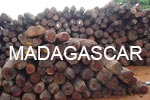SEAL, a French transport company, is scheduled to ship 79 containers of rosewood tomorrow from the port of Toamasina on its vessel Terra Bona, reports Midi Madagascar. The shipment — worth nearly $16 million — comes less than three months after Madagascar’s ruling authority banned timber exports after international uproar over the organized logging of the country’s national parks in the aftermath of last year’s military coup. SEAL’s shipment of timber will be in direct violation of the moratorium.
Madagascar’s Ministry of Environment estimates there are some 1,500 containers’ worth of precious hardwoods awaiting shipment in northeastern Madagascar. The street value of a container full of rosewood is around $200,000, according to a study published last year by researchers at the Missouri Botanical Garden.
Related articles

Researchers: Madagascar rosewoods deserve CITES protection
(05/27/2010) A new policy paper in Science warns that several species of Madagascar’s rosewood could be pushed to extinction due to a current illegal logging crisis on the island. These hardwood species should be considered for protection under Convention of International Trade in Endangered Species of Wild Fauna and Flora (CITES), the researchers conclude.
Madagascar passes decree banning rainforest timber trade
(04/27/2010) Madagascar’s transitional government has finally signed a decree banning the logging and trade of precious hardwoods, a month after announcing the moratorium.
New timber ban failing to stop illegal logging in Madagascar
(04/04/2010) Rainforest timber continues to be cut illegally from Madagascar’s national parks despite a recently announced moratorium on precious wood exports and logging, reports a source from the Indian Ocean island nation.

Madagascar bans rainforest timber exports following global outcry
(03/25/2010) Under mounting pressure over illegal logging of its national parks, Madagascar’s transitional government on Wednesday reinstated a ban on rosewood logging and exports. The decree (no. 2010-141), which prohibits all exports of rosewood and precious timber for two to five years, was announced during a council meeting held yesterday at Ambohitsorohitra Palace in Antananarivo, Madagascar’s capital city.
Environmental groups call on Delmas to cancel shipment of illegally logged wood from Madagascar
(03/15/2010) Pressure is building on the French shipping company Delmas to cancel large shipments of rosewood, which was illegally logged in Madagascar during the nation’s recent coup. Today two environmental groups, Global Witness and the Environmental Investigation Agency (EIA) called on Delmas to cancel the shipment, which is currently being loaded onto the Delmas operated ship named ‘Kiara’ in the Madagascar port of Vohemar.

How to end Madagascar’s logging crisis
(02/10/2010) In the aftermath of a military coup last March, Madagascar’s rainforests have been pillaged for precious hardwoods, including rosewood and ebonies. Tens of thousands of hectares have been affected, including some of the island’s most biologically-diverse national parks: Marojejy, Masoala, and Makira. Illegal logging has also spurred the rise of a commercial bushmeat trade. Hunters are now slaughtering rare and gentle lemurs for restaurants.

Satellites being used to track illegal logging, rosewood trafficking in Madagascar
(01/28/2010) Analysts in Europe and the United States are using high resolution satellite imagery to identify and track shipments of timber illegally logged from rainforest parks in Madagascar. The images could be used to help prosecute traders involved in trafficking and put pressure on companies using rosewood from Madagascar.

Coup leaders sell out Madagascar’s forests, people
(01/27/2010) Madagascar is renowned for its biological richness. Located off the eastern coast of southern Africa and slightly larger than California, the island has an eclectic collection of plants and animals, more than 80 percent of which are found nowhere else in the world. But Madagascar’s biological bounty has been under siege for nearly a year in the aftermath of a political crisis which saw its president chased into exile at gunpoint; a collapse in its civil service, including its park management system; and evaporation of donor funds which provide half the government’s annual budget. In the absence of governance, organized gangs ransacked the island’s biological treasures, including precious hardwoods and endangered lemurs from protected rainforests, and frightened away tourists, who provide a critical economic incentive for conservation. Now, as the coup leaders take an increasingly active role in the plunder as a means to finance an upcoming election they hope will legitimize their power grab, the question becomes whether Madagascar’s once highly regarded conservation system can be restored and maintained.